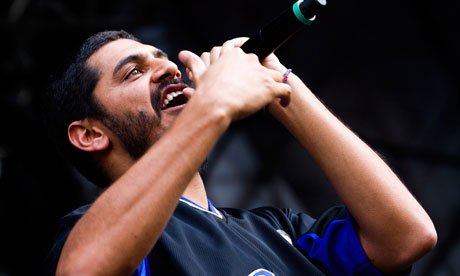
Kleber Gomes was 10 when he penned his first song about São Paulo. The year: 1985. The 1985 track: a punk rock tune about his home on its gritty southside.
One of five brothers and sisters born to migrants from north-east Brazil, the budding composers knew more than most about issues plaguing megacities – entrenched poverty, police violence, social discrimination.
Few, however, could have predicted how far such compositions would take Gomes. Today, the 36-year-old is one of Brazil's most critically acclaimed artists, a rapper, composer and urban poet, known by his stage name Criolo.
Since his album Nó na Orelha was released last April to rave reviews, an avalanche of awards has transformed a once-struggling ghetto MC into a modern-day bard for the megacity: Criolo recently played his first gig in New York and will tour Europe and the US later this year.
Caetano Veloso, the legendary Brazilian singer and composer, describes him as "possibly the most important figure on the Brazilian pop scene". "Criolo is a strong presence because he is original," he told the Guardian. "He is far more nuanced than a traditional rapper."
During a recent interview in Rio de Janiero, a softly spoken Criolo offered a more modest appraisal of his work. "I'm just singing my story," he said.
His story begins in the north-east city of Fortaleza in 1973, when his parents set off on the gruelling 1,860-mile (3,000km) journey south to São Paulo. "They came fleeing the drought, fleeing hunger," he says.
If the family had hoped for gold-paved streets, they were disappointed. Their first shelter was a dingy basement in a slum far from São Paulo's bustling financial centre. From there they moved to a neighbouring shanty, the Favela das Imbuias, where Criolo spent the first five years of his life.
"It was the periferia," he said, using the Portuguese word for the tatty belts of housing that encircle most Brazilian cities. "I remember my father had to beat the mud floor to flatten it … We used trunks and wood to put the house together. It was a shack."
Criolo stacked supermarket shelves and sold clothes door to door to stay afloat. On leaving school, he gave history-of-art and sculpture classes to high school children and spent seven years working with "at risk" children on the streets of São Paulo.
"I don't like to talk about it … It was too crazy," he says of the experience. "I could have been one of those kids."
With Brazil's economy galloping towards becoming the fifth largest in the world, his music is a stark reminder of the millions struggling not to be left behind.
His lyrics tackle themes ranging from urbanisation and public transport to police violence and racism. One track describes a double murder; others mix references to cocaine abuse and Heckler & Koch firearms with nods to the Mexican artist Frida Kahlo and Nigeria's Afrobeat pioneer Fela Kuti.
"I don't need glasses to see what is going on around me," Criolo raps in one track.
He says: "It is legitimate for me to sing about sanitation because I spent eight years of my life living in a situation where we had to get water from a well to take a shower.
"These are São Paulo themes but I think they are relevant to anywhere," he added. "Where there are people, there are stories, there is life. And this is enough."
During Brazil's 1964 dictatorship, composers such as Veloso, Gilberto Gil and Chico Buarque were forced into exile for their coded lyrics about state repression. In the 1980s, rock bands railed against political corruption. Now, Criolo appears to be taking up the protest mantle.
At his first major show in Rio last week he held a banner denouncing police brutality. The following night, in Salvador, he debuted a song hitting out at urban violence and made reference to a fire that had forced hundreds of slum-dwellers from their homes in São Paulo.
"From his direct and enigmatic verses emerges a political discourse that seems intimately personal," said Veloso, left. "He has not turned himself into a bullet-proof tank to answer injustice. On the contrary, he exposes his sensibilities."
Criolo's critiques are not limited to urban themes. During an interview on Brazil's MTV he wore a T-shirt emblazoned with the words "SOS Forests" and spoke about the threat of the Belo Monte dam, being built in the Amazon rainforest.
Asked for his opinion on the Brazilian president, Dilma Rousseff, Criolo ducked the question. "What I can do are my T-shirts and my songs," says Criolo.

